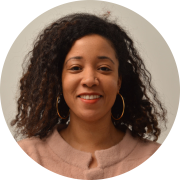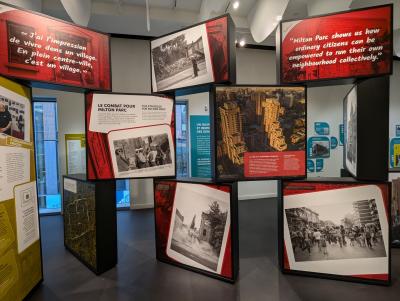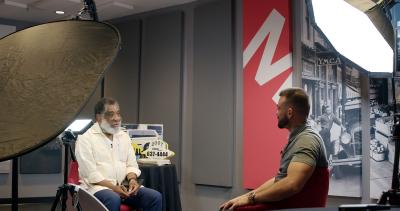Women's Stories of Immigration: A Collaborative Project
Women’s Stories of Immigration is an oral history project produced by the Collectif des femmes immigrantes du Québec (Le Collectif) and the MEM – Centre des mémoires montréalaises. In articles, videos, and a short film, women share their stories of immigration and integration.
“The struggles of immigrant women are and always have been different from those of Quebec women.”
- Aoura Bizzarri, Director, Le Collectif
The start of something bigger
Mémoires d'immigrantes - 20 mars
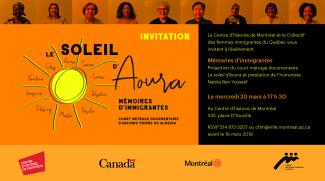
On June 6, 2017, in the Hall of Honour at Montréal’s city hall, Aoura Bizzarri, director of Le Collectif, attended the launch of the Stories of Immigration chapter of the Mémoires des Montréalais website. She was impressed by the project and struck up a conversation with Annick Brabant, a member of the MEM team. When Annick heard about Le Collectif’s rich history, she wanted to share it with all Montrealers. She met with Aoura at Le Collectif’s offices on November 8, 2017 , and wrote an article about the organization for Mémoires des Montréalais. But it would take more than a year for the article to be published – on International Women’s Day, 2019, no less – because it was destined to be only the beginning of a larger collaboration.
In late October 2017, the MEM had approached Le Collectif about partnering on a project. The answer was an enthusiastic yes. In the space of a few meetings, the two organizations outlined a concept and drafted a grant application, which they submitted in December 2017 under the Events component of Inter-Action, a Department of Canadian Heritage funding program. On August 29, 2018, they finally received confirmation that their application had been approved.
Women’s Stories of Immigration: The framework
Mémoires d'immigrantes - 11 déc. 2018
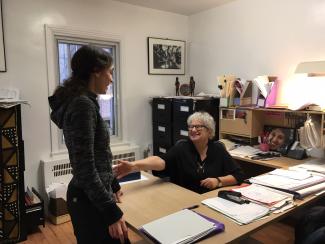
The goal of the collaborative project was to promote awareness and understanding of the trajectories and experiences of immigrant women, whether newly arrived or long established, as told in their own voices. In recorded interviews, immigrant women spoke about their immigration journey and integration into Quebec society. The project culminated in the production of a short documentary that was screened at a public event at the MEM on March 20, 2019.
Le Collectif, the MEM, and the film’s director, Antonio Pierre de Almeida, met numerous times to plan, implement, and oversee the project. This commitment to collaboration at all levels of decision-making and at every step of the project was consistent with the new direction adopted by the MEM in 2011; along with the addition of oral sources to the institution’s collecting and mediation practices, it reflected the MEM’s embrace of emerging practices in social museology.
Immigrant women tell their stories
preparation_tournage-site.jpg
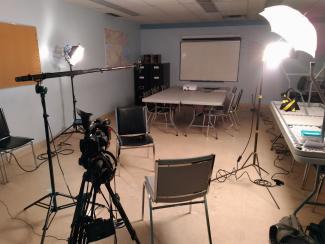
In preparation for the interviews, the project team selected participants, formulated questions, determined the format, managed consent forms, and carried out preliminary interviews.
Julie Noël (MEM project coordinator) and Laura Noyer (manager of Le Collectif’s women’s centre) conducted the interviews. Following the advice of the film’s experienced and attentive director, they let participants “speak freely,” even when it meant “allowing for silence” in emotional moments.
Every recording session began with a clap, and then “One minute of silence…and rolling.” Thus was launched a series of interviews with immigrant women, each with their own stories, but all determined to carve out a space for themselves in Quebec, economically and socially.
Aoura, Dary, Darling, Farida, Faustina, Marta, Sana, Perpétue, and Laura were chosen because of their connection to Le Collectif and the range of immigration and integration experiences that they represented. They spoke generously and openly about their setbacks and achievements, sometimes for hours. Several stories were surprising, especially those that ran counter to accepted narratives. For instance, Faustina described the circumstances that led to her having to learn English before French in the 1960s. Others spoke about the difficulties they faced in having their credentials recognized. There were other surprises, too. In some instances, issues or anecdotes that had stood out during the preliminary interviews played only a minor role in the stories the women ended up telling. This exercise in gathering oral history through personal narratives revealed that to better “tell our stories,” the focus needs to be on the storyteller—in this case, the immigrant women at the heart of the project.
A resource and a workplace
20 mars 2019
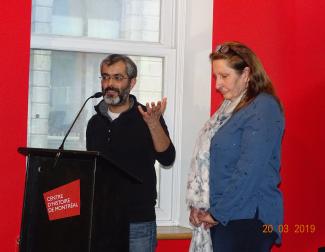
The production team captured the participants’ stories, but they also documented Le Collectif’s role as a work and living space. Some of the project participants had benefited from its free services, such as French, English, and computer classes. Others—including Dary, Farida, and Marta—had taken part in Le Collectif’s job search program and then been hired by the organization. These employment experiences helped them get their footing, economically and socially, in Quebec society.
The other employees, filmed in their place of work, attest to the diversity and significance of the immigrant workforce in Montréal. They also highlight the importance of Le Collectif’s work in support of the professional integration of newcomers in Quebec.
Aoura’s Story: The documentary
There was a tight turnaround time for the documentary film. After just a few days of filming in December 2018 and January 2019, Antonio produced a first excerpt, focused on the history of Le Collectif, to accompany invitations to the film’s premiere. With a green light from Le Collectif and the MEM, the clip was released on schedule on March 8, 2019—International Women’s Day—as part of Annick Brabant’s article about Le Collectif on the Mémoires des Montréalais website.
20 mars 2019
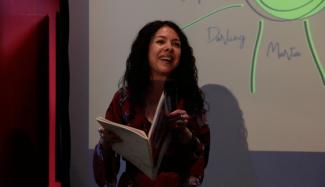
“And… Cut!” A public event and celebration of Women’s Stories of Immigration was held on March 20, 2019 at the Centre d’histoire de Montréal (the MEM’s former location). Nearly a hundred people attended, including project participants, Le Collectif employees and members, funding agencies, and the general public. Comedian Nabila Ben Youssef, herself an immigrant, opened the event and introduced the screening of the 22-minute documentary. The audience response during and after the screening was a moving testament to the project’s success. The MEM and Le Collectif had succeeded in creating a work that amplified the voices of immigrant women, while also paying tribute to their experiences and contributions to Montréal life.
“Cut!” No, not really, because the experience is not over yet. Videos and articles, based on the participants’ stories, will be published in the Women’s Stories of Immigration dossier on the MEM website. Le Collectif is the subject of both a profile and the documentary Aoura’s Sun: A Story of Immigrant Women, which highlights the ongoing importance of Le Collectif’s work. For the MEM, the partnership resulted in a significant addition to its website, and it served as proof of concept for the value of participatory museology. It also yielded new material for the MEM’s oral history collection. This, of course, is just a start. There are so many more stories to be uncovered!
Today, the experience continues. A clap and…“Rolling!”
Références bibliographiques
BAILLARGEON, Denyse. « Histoire orale et histoire des femmes : itinéraires et points de rencontre », [En ligne], Temps et mémoire des femmes, vol. 6, no 1, 1993, p. 53-68.
https://www.erudit.org/en/journals/rf/1993-v6-n1-rf1647/057724ar.pdf
CHARLEBOIS, Catherine, et Jean-François LECLERC. « Les sources orales au cœur de l’exposition muséale. L’expérience du Centre d’histoire de Montréal » », Revue d’histoire de l’Amérique française, vol. 69, no 1-2, 2015, p. 99-136.
RICCI, Amanda. « Un féminisme inclusif? La Fédération des femmes du Québec et les femmes immigrantes ou racisées, 1966-1992 », L’histoire politique au Québec : un état des lieux, vol. 25, no 3, 2017, p. 102-123.
CHOUAKRI, Yasmina. « Femmes immigrantes nouvellement arrivées et égalité entre les sexes : État de la situation dans la région de Montréal. Projet La caravane des solidarités féministes », [En ligne], Table des groupes de femmes de Montréal, 2009. (Consulté le 15 février 2019).
https://www.tgfm.org/files/femmes-immigrantes---%C3%A9tat-de-situation-1.pdf
